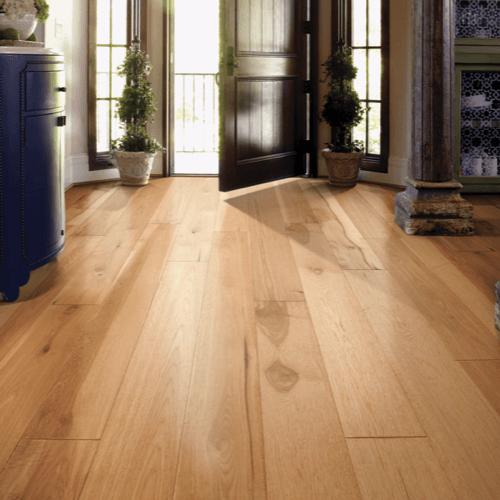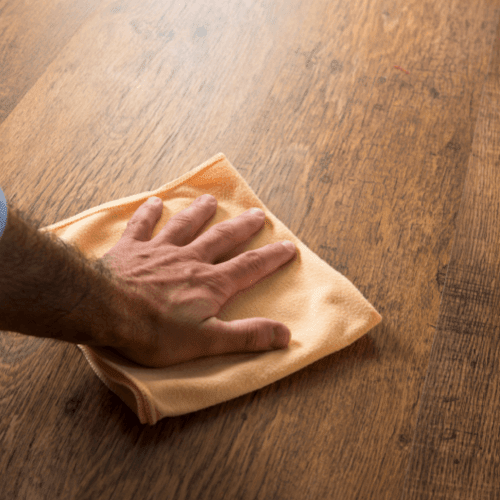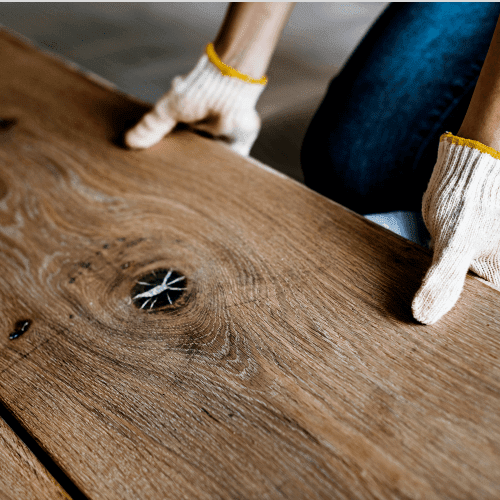null
With its rich textures, warm hues, and distinctive grains, hardwood flooring will add charm and natural elegance to any home.
Hardwood has the ability to transform a room, enhancing its look and feel with unmatched beauty. Whether you prefer a contemporary or traditional design style, rustic or sophisticated, hardwood offers a wide range of options to match your aesthetic. The versatility of hardwood flooring makes it a timeless choice that complements various interior designs, creating a cohesive and visually appealing space.
While there is no question about hardwood's ability to elevate any home, it's important for homeowners to consider both the advantages and disadvantages before investing in hardwood. By understanding these pros and cons, you can make an informed decision that aligns with your needs and preferences. At Stine Home + Yard, we can help you decide if hardwood meets your style, your performance needs, and your budget.
The Durability of Hardwood

Hardwood Durability Advantages
One of hardwood's most notable advantages is its incredible durability. With the right care, hardwood can even last for decades, or in some cases, even a lifetime. Resistant to daily wear and tear, hardwood is an excellent choice for high-traffic areas of your home. There are several species known for their exceptional strength and resilience, including walnut, oak, and maple. These hardwood species are naturally resistant to scratches, dents, and other forms of damage, making them ideal for areas prone to heavy use. Plus, solid hardwood can be refinished multiple times. If scratches or dents do occur, hardwood floors can be sanded down and refinished, restoring their original beauty and increasing their longevity.
Limitations of Hardwood's Durability
Though hardwood is a great addition to most rooms in your home, including high-traffic hallways and living rooms, hardwood has some limitations. Solid hardwood flooring will bow or warp when exposed to moisture, so they are not ideal for bathrooms or laundry rooms. Some species of hardwood, such as pine, is not as dense and can be scratched or dented easier than other species. Although hardwood is resistant to regular wear, it is not impervious to scratches. Some shoes, moving furniture without protective pads, or pet claws can leave visible marks.
Hardwood Maintenance

Hardwood Maintenance Advantages
Hardwood's ease of routine maintenance makes it a practical and appealing choice for many homeowners. One of the reasons hardwood flooring works well in busy households is its easy upkeep. Regular sweeping or dusting is all that's needed to prevent dirt and grime from scratching its surface. Most hardwood floors can also be damp-mopped, but be cautious to avoid standing or pooling water that could damage the wood. Additionally, spills can be easily wiped away, preventing stains and preserving the floor's appearance.
Limitations of Hardwood Maintenance
Solid hardwood flooring is sensitive to moisture, and prolonged exposure to water can cause the wood to warp or bow, making it unsuitable for high humidity areas or spaces prone to water, such as bathrooms or laundry rooms. Furthermore, despite the durability of hardwood, it can be susceptible to scratches from sharp objects or heavy furniture. Homeowners may need to invest in refinishing to restore the beauty of their hardwood floors over time. Minor scratches can often be addressed with oil or filler sticks, while deeper scratches may require professional refinishing to restore the floor's original appearance.
The Cost of Hardwood
Return on Investment for Hardwood
Though hardwood may have a higher upfront cost compared to other flooring types, it is a sound investment for many homeowners. Its longevity surpasses that of most flooring options, and in the event of damage, hardwood can be refinished rather than completely replaced. Hardwood flooring's timeless appeal adds value to your home, which can be advantageous if you intend to sell in the future. When considering its durability, long lifespan, and potential increase in home value, hardwood flooring is a cost-effective choice for many homeowners.
Cost Considerations for Hardwood
Hardwood requires a larger investment up front than other flooring types, which can strain some homeowner's budgets. Hardwood is more expensive, especially if you are choosing a premium or exotic species of wood. Installation costs are also typically higher for hardwood since it requires specialized skills and more labor to ensure proper installation. For those on a tight budget, there are more economical flooring options available that provide affordability. When considering hardwood flooring, it's crucial to carefully evaluate the initial investment and weigh it against the long-term benefits to determine if it aligns with your financial circumstances and home improvement goals.
The Sustainability of Hardwood
Environmental Benefits of Hardwood
Hardwood flooring stands out as an eco-friendly and sustainable choice due to its natural and renewable characteristics. Unlike synthetic flooring types, hardwood is sourced from sustainable forests and can be harvested ethically. The production process for hardwood flooring generally involves lower energy consumption. The long lifespan of hardwood means less frequent replacement, reducing waste. By choosing hardwood flooring, homeowners can make an environmentally conscious decision that supports the promotes sustainability in the flooring industry.
Environmental Drawbacks of Hardwood
One concern with the eco-friendly nature of hardwood flooring is that it contributes to deforestation and habitat loss. Clearing forests for hardwood can disrupt natural ecosystems and have negative effects on biodiversity. When hardwood needs to be transported over long distances, it can result in increased carbon emissions. Another aspect to consider is the lengthy growth period of trees, as it takes many years for them to reach maturity for harvesting as flooring material.
The Installation of Hardwood

Professional Hardwood Installation Advantages
Hiring professionals for hardwood installation offers several advantages that guarantee exceptional results. With their expertise and specialized tools, professionals can ensure that your hardwood floors are installed flawlessly. Their experience and training enable them to handle the intricate details of the installation process, such as precise measurements, seamless transitions, and proper subfloor preparation, resulting in a floor that performs optimally and stands the test of time. Professionals have the knowledge and skills to install hardwood in various patterns, such as diagonal, chevron, or herringbone, which can elevate the aesthetic appeal of your home and create a personalized look.
The Complexity of Hardwood Installation
The installation of hardwood flooring can be a complex process, especially for novice DIYers. From preparing the subfloor to properly acclimating the wood, each step plays a crucial role in achieving a successful installation. The complexity of hardwood installation often requires specialized tools and equipment that may not be readily available to DIYers, making it more difficult to achieve a professional finish.
Before making the decision to install hardwood flooring, it's important to carefully evaluate the pros and cons to ensure it meets your style, lifestyle, and financial requirements. The exceptional durability of hardwood, its ability to withstand daily wear and tear, and the ease of maintenance it offers enable homeowners to effortlessly keep their floors looking pristine. Although hardwood may require a higher upfront investment, its long-term benefits, such as increased home value, make it a financially wise choice. Additionally, choosing eco-friendly hardwood flooring adds a timeless charm to your home, ensuring lasting beauty that stands the test of time.